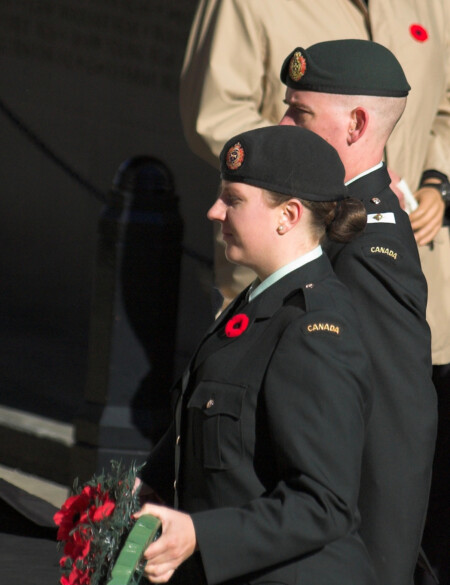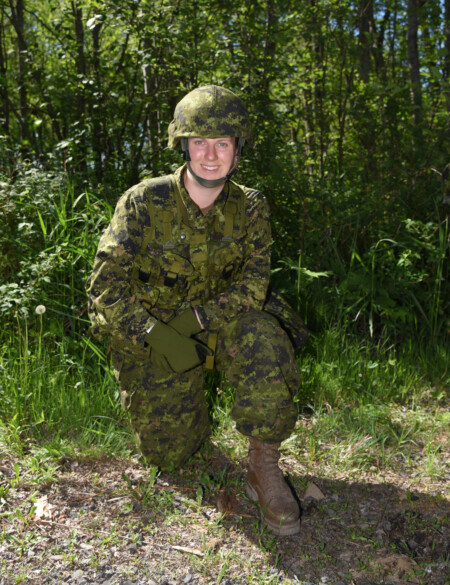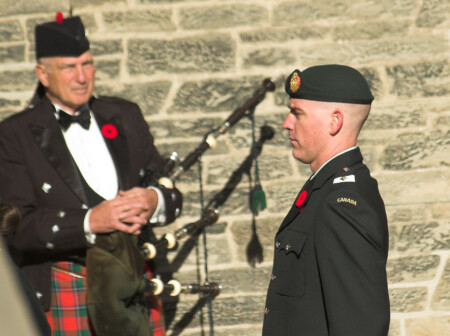Ministry of presence: exploring military chaplaincy
Published March 2017

Charmila Ireland and Seaton Brachmayer place a wreath at the Soldiers’ Tower at the University of Toronto Remembrance Day Service in 2016.
“Basic Training? It was the best experience I never want to have again!” said Charmila Ireland, Divinity student at Knox. She, along with fellow Knox student Seaton Brachmayer and 16 others, experienced basic training at the St. Jean Army Base last summer. Their in-person training lasted just four weeks, after two weeks of online courses. Held specifically for chaplains and medics, this condensed version omitted combat maneuvers, tactics, and most weapons training (other than disarming).
The average age of this group was 42 – quite a shift from the 18- to 25-year-olds typically present for basic training. Ireland was the youngest at age 26. Most of the group (all training to be chaplains) were adults with other careers, and this was their first exposure to the military.
New leadership styles
In ministry, Ireland noted, the leadership approach that’s most often helpful is conciliatory, oriented toward consensus and community. The military style of leadership at basic training, in contrast, is more “top-down” and all about the chain of command. Ireland said, “About four days in, our group got a talking-to from our captain. We had thought we were doing pretty well, but the gist of his speech was: ‘When you’re told to do something, you just do it. You don’t argue or question.’ We had not done so well at that. Throughout training they drilled into us how important it was to follow the chain of command.”
Ireland said, “We needed to learn how to give orders as well. We took turns being the leader amongst the students and were responsible for the day. They told us to strike the word ‘please’ from our vocabulary! That was hard for some of us. But the skills are still transferrable. Different situations call for different leadership styles, and now I know I can work in a variety of ways. I’m a more confident leader.
“Now I’m more willing to take charge and take responsibility; part of being student commander was taking responsibility for the team,” she said. “Also, you can’t be perfect. You have to learn how to take criticism, roll with the punches, and take the blame even for things that weren’t your fault. Sometimes in life there are no-win situations.”

Charmila Ireland
Sharing soldiers’ experiences
Basic training taught Ireland and Brachmayer about the military’s structure and workings, and it taught them a variety of skills relevant to their roles. Further, Ireland said, “We now have the shared experience of basic training, which every single soldier goes through. It’s vital that we understand and can empathize. We now have that shared experience as starting point.”
“A significant part of chaplaincy is a ministry of presence,” she said. “We are there with them, demonstrating that we care; we become known that way. People want a chaplain who’s out doing a ruck march with them.”
Brachmayer said, “With the world’s increasing secularization, some people ask whether chaplains should still be a part of the military. But they’re there because they’re needed; the soldiers still have these faiths.” He had been surprised to learn in training how diverse the chaplaincy corps is now. It used to just be Protestant and Catholic ministers; but it now includes imams, rabbis, aboriginal spiritual leaders, and others, according to soldiers’ needs at each base.
Ireland said, “It doesn’t matter what your view on faith is, and whether you’re an atheist or agnostic or Rastafarian or Christian or Buddhist or Muslim; in the military there are people of these faiths, and they need someone to talk to. And even for those without a faith, the chaplain can be a good resource.”
Receptivity to faith conversations
Both Brachmayer and Ireland also did on-the-job training over the summer, in addition to basic training. “For the most part, people are open to chaplains,” Brachmayer said. “They see the chaplain uniform and want to talk. They might want to question why I believe something, or they may have questions about life. In the army, life can change very quickly, and people are exposed to more immediate dangers; that opens people up to bigger questions.
“Some aren’t people of faith. Some have been hurt by a religious institution. Others want to vent. You’re there for that as well,” he said.
“What I thought a chaplain did was some preaching and a little counseling. What I learned that a chaplain actually does – is almost everything: including hospital visits, funerals, and family care (since we’re responsible for all military members and their families). Chaplains are part of military’s ‘mental health and spiritual care’ triangle – along with social workers and psychologists.”
“We operate as peers with soldiers of all ranks, but we also have unlimited access to the chain of command. Chaplains are afforded a significant level of respect – a lot more respect than I thought there would be,” said Brachmayer.
Ireland said, “The chaplain is meant to keep the chain of command informed on moral and morale issues in their units, and to keep morale up.”
Brachmayer recognizes that not everyone supports the armed forces. “But,” he said, “isn’t that all the more reason to send the light of Christ into terrible situations, places that need Jesus?” He sees military chaplains as doing God’s work in some of those most-needed times and places.

Seaton Brachmayer at the 2016 University of Toronto Remembrance Day Service.
Winding paths to chaplaincy
Brachmayer has been interested in serving in the armed forces since childhood, but for many years that future had seemed unlikely. He majored in social work as an undergraduate, and at that point he wasn’t interested in pursuing a master’s degree (which is required for social workers in the military). Then he was called into ministry – and thought that was certainly the end of his military prospects. But a series of people told him he sounded like a chaplain, and when he learned about military chaplaincy, he signed up almost immediately.
Military chaplains are in somewhat short supply at present, in part due to burnout. Going along on next-of-kin notifications, for example, can be quite taxing. Brachmayer said he’s very aware of burnout and the importance of self-care. “Every chaplain I talked with said that you must keep up your own spiritual life, your personal devotions, your physical exercise – for your own sanity. You can’t do your job if you don’t. You need to be deliberate.”
Balancing out concerns about burnout, Brachmayer is attracted to the chaplaincy role for many reasons. “I work well with strong structure,” he said. “I don’t push back against rules and orders. So the military is a good fit for me. Chaplaincy offers a secure job future, and I enjoy being part of a team. Not all pastoral roles offer that. I also like that chaplaincy isn’t about the ‘numbers,’ which building a congregation can become. And I appreciate that chaplains offer practical support in a variety of ways, not only spiritual support.”
Ireland had been interested in military service since the end of high school, but she had been concerned about the military’s “Universality of service” rule. It states that any member of the armed forces, no matter what his or her trade, must be fully trained for and can be called into combat. Ireland wasn’t unduly afraid of combat, but she didn’t believe that she could kill another person. Chaplains, however, are the only members of the armed forces not permitted to carry a weapon.
Brachmayer explained that chaplains still go along on patrols, “But we’re meant to be the prophetic voice that says what things should look like, even though they don’t look like that now.” They’re trained to disarm weapons, but the law says they cannot pick up a weapon in battle.
When Ireland first heard about military chaplaincy, she talked with Brachmayer. He told her about the Chaplain Branch of the Reserve Entry Scheme Officer (RESO) Program for M.Div. students, of which both are now a part. The program requires two full summers of training and job shadowing, and two years of ordained ministry. When Brachmayer and Ireland complete these requirements, they can enter the armed forces (either full-time or reserve) as military chaplains. Both Ireland and Brachmayer intend to graduate from Knox College this May with Master of Divinity degrees, and both are actively serving in the armed forces – Brachmayer as lieutenant and Ireland as second lieutenant.
Editor’s update in 2022: Both Ireland and Brachmayer have, as of 2022, obtained positions as military chaplains.
